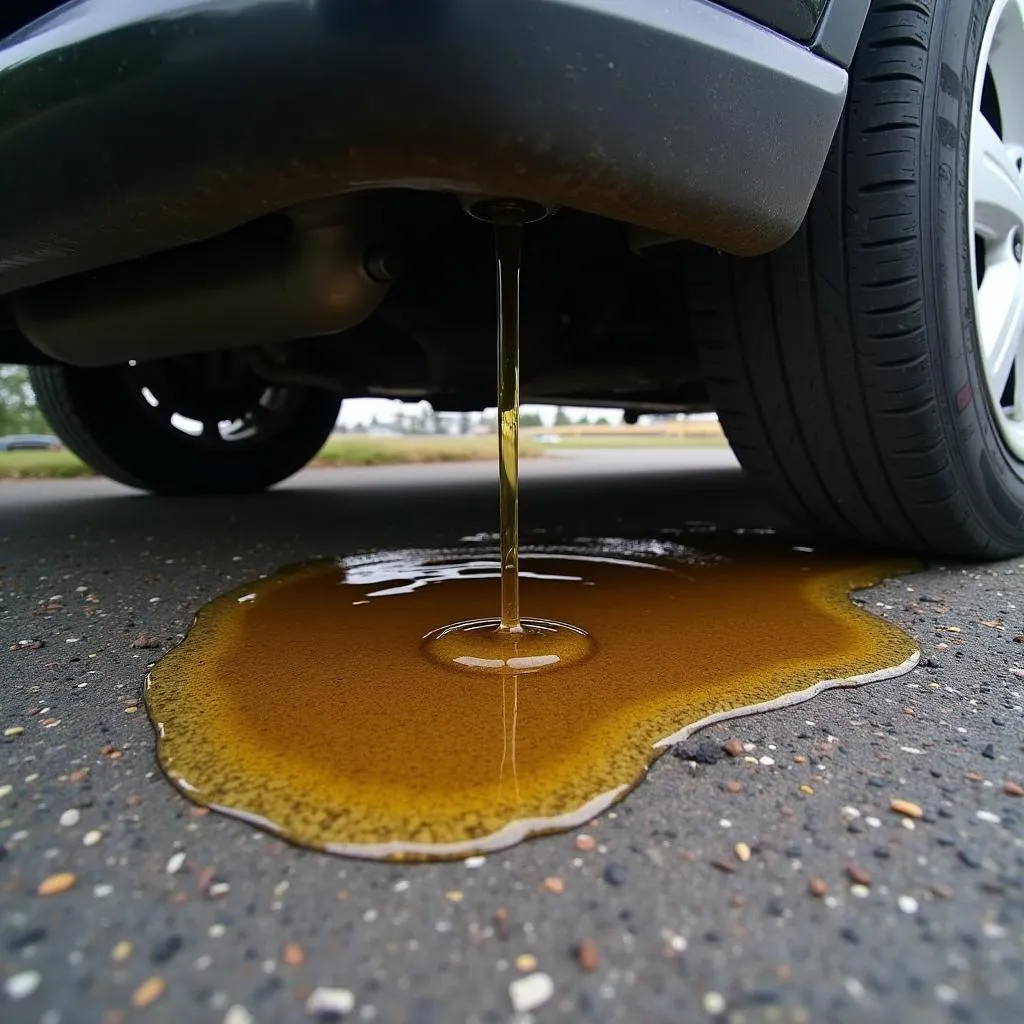“Just had my oil changed, and now my car’s leaking oil! What gives?” Sound familiar? You’re not alone. Discovering a fresh oil stain under your car after an oil change can be frustrating, but don’t panic! It’s often an easily fixable issue. Let’s dive into the common culprits behind this messy problem and how to get it sorted out.
You might be surprised to know that a lot of drivers are concerned about their car maintenance, specifically when it comes to oil changes. If you’re wondering about the right time for your first oil change on a new car, we have a helpful guide for you: When To Get First Oil Change On New Car.
Understanding the Mess: Why Oil Leaks Happen After an Oil Change
Think of it like this: your car’s engine relies on a carefully measured amount of oil to run smoothly, just like your favorite recipe needs the right ingredient proportions. An oil change is simply replenishing this vital fluid. However, even the most skilled mechanics can sometimes make minor mistakes, like a waiter accidentally spilling a bit of your drink.
Here are the usual suspects behind post-oil change leaks:
1. Loose Oil Drain Plug:
This is the most common reason. It’s like forgetting to tighten the lid on your milk jug – a recipe for a messy spill! If the drain plug isn’t tightened enough, oil can seep out, especially when the engine is running and pressure builds.
2. Damaged Oil Pan:
Over time, your car’s oil pan (the reservoir that holds the oil) can become dented or cracked, often due to road debris or rough driving conditions. A new oil change can sometimes exacerbate these existing issues, leading to leaks.
3. Faulty Oil Filter:
Think of the oil filter as a coffee filter, catching any impurities in the oil. A damaged or improperly installed filter can disrupt this process, causing leaks. This is why using the correct filter for your car model is crucial.
4. Overfilling:
Just as pouring too much batter in a cupcake tin leads to overflow, putting in too much oil can cause leaks. This can force excess oil past seals and gaskets, resulting in those unwanted drips.
 Car leaking oil under the engine
Car leaking oil under the engine
Troubleshooting the Issue: Getting to the Root of the Problem
Before you rush back to the mechanic, try these simple checks:
- Park on a level surface and check for leaks: Is it a slow drip or a steady stream? The severity can give you a clue.
- Inspect the oil drain plug: Can you tighten it further by hand? Caution: Don’t overtighten it!
- Examine the oil filter: Is it securely in place? Any visible cracks or damage?
- Check your oil dipstick: Is the oil level above the maximum mark?
Finding the Fix: What to Do Next
If your DIY investigation doesn’t reveal the culprit, it’s time to bring in a professional. A trusted mechanic can quickly diagnose and address the issue. They have the tools and expertise to tighten loose plugs, replace faulty filters, or even repair damaged oil pans.
“Remember,” says automotive expert [Name Surname], author of [Book Title], “a small oil leak, if ignored, can lead to bigger problems down the road. It’s always best to err on the side of caution and get it checked out.”
FAQs: Common Questions About Oil Leaks After an Oil Change
Q: How much does it cost to fix an oil leak?
A: The cost can vary depending on the severity and cause. A simple drain plug tightening might be a quick fix, while a damaged oil pan replacement can be more involved.
Q: Can I drive my car with an oil leak?
A: It’s best to avoid driving if possible. Even a small leak can quickly deplete your engine oil, leading to potential engine damage.
Q: How often should I get my oil changed?
A: Refer to your car’s owner manual for recommended intervals. Generally, most mechanics suggest every 3,000 miles or 3 months for conventional oil or every 5,000-7,500 miles for synthetic.
 Mechanic checking for oil leaks
Mechanic checking for oil leaks
Related Concerns: Beyond the Oil Change
Sometimes, what seems like a simple oil leak after an oil change can be a symptom of a larger issue. If you’re experiencing other problems like unusual noises, warning lights on your dashboard, or a drop in engine performance, it’s crucial to get your car checked by a qualified technician immediately. For instance, you can check out our article on Dodge OBD Codes P2056 for information on a specific issue. Also, if you are looking for car repair in Salisbury, NC, we can recommend some reputable shops in the area: Car Repair Salisbury NC.
You can find more useful resources and information on our website, such as articles on 2006 Grand Caravan OBD Codes. Understanding your car’s systems can help you catch potential problems early on. If you’re interested in DIY diagnostics and need guidance on using an Innova 3100 code reader, we have a comprehensive manual: Innova 3100 OBD II Code Reader Manual.
Need Help? We’re Here for You!
Experiencing car troubles? Don’t let a pesky oil leak spoil your day. Contact us via Whatsapp at +84767531508 for expert assistance with your diagnostic tools. Our team of automotive specialists is available 24/7 to provide the support you need.
